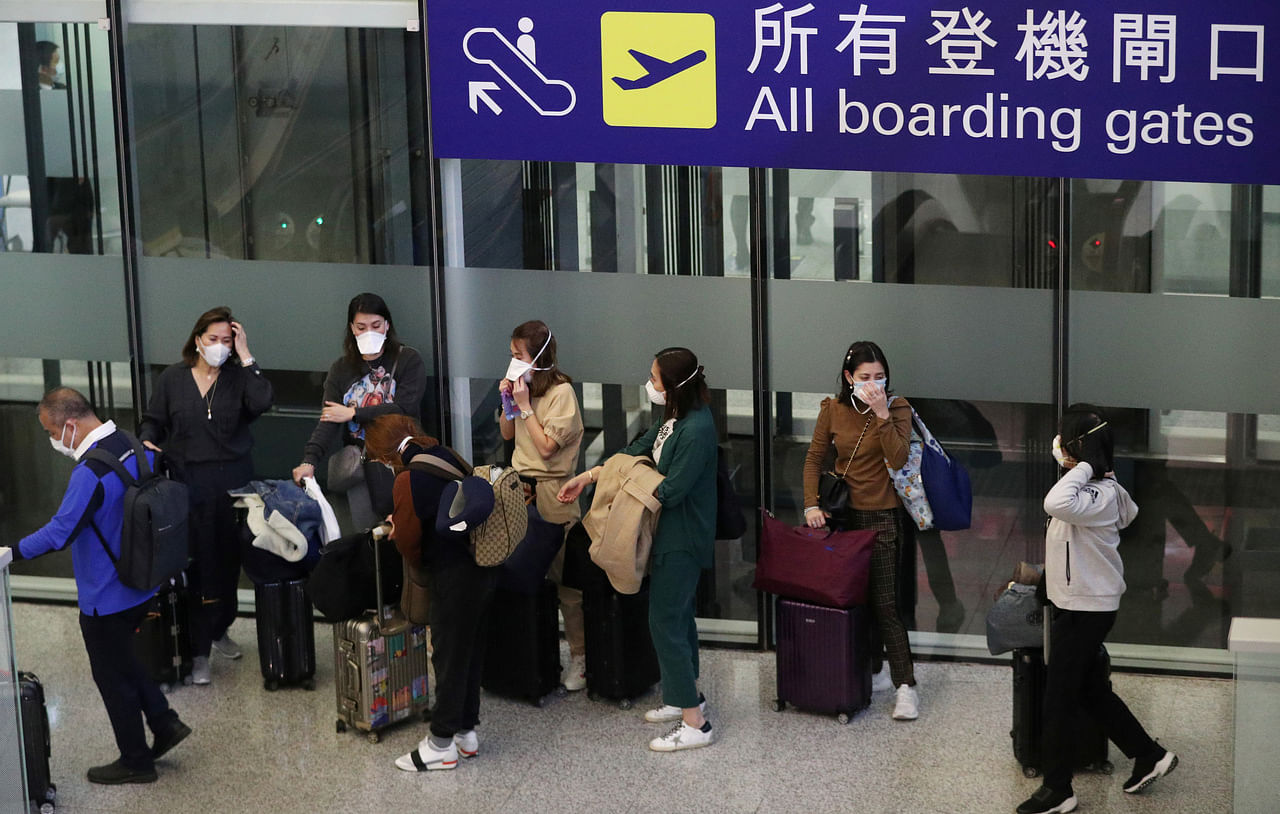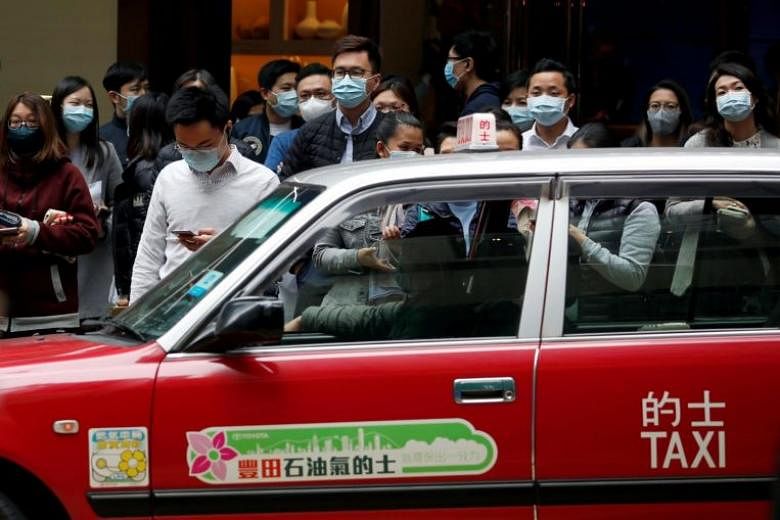HONG KONG - Singapore and Hong Kong are seeing almost as many cases of a highly infectious coronavirus which is thought to have originated from mainland China despite the Chinese territory's proximity to the mainland, possibly due to differences in their approaches to the crisis, experts said.
In the 2003 outbreak of the severe acute respiratory syndrome (Sars), which also originated in China, Hong Kong saw more than 20 per cent of the global total of cases and accounted for almost 40 per cent of the global death toll. Singapore made up just 3 per cent of the cases and 4 per cent of the fatalities worldwide.
Yet, the number of cases that have tested positive for the coronavirus - officially named Sars-CoV-2 - in Hong Kong surpassed that in Singapore only on Tuesday (Feb 11). Hong Kong now has 50 confirmed cases of the infection, officially called Covid-19, including one death, compared with Singapore's 47 confirmed cases.
Experts point to differences in standards of detection in the two cities, according to the South China Morning Post (SCMP).
Hong Kong has 13 border crossings with mainland China, and three remain open. Singapore, in contrast, is more than 3,500km away and has closed its borders to all new visitors from China since Feb 1.
Singapore's Government has been actively identifying those affected, communicating effectively and transparently with the public, while Hong Kong officials appear to be scrambling to deal with the outbreak, issuing sometimes contradictory directions, healthcare experts say.
Singapore may be identifying more cases because its citizens are motivated to come forward if they are unwell, SCMP cited Dr Leong Hoe Nam, an infectious disease expert at Mount Elizabeth Novena Hospital, as saying. The Ministry of Health has offered financial help to quarantined Singaporeans, permanent residents and work pass holders as well as their employers. Confirmed cases also receive free medical treatment.
"You are not short-changed at all so there is no reason to stay away and hide," Dr Leong said. "The idea is to draw every (potential) case out into the open and get tested."
Singapore may appear to have many more confirmed cases than its neighbouring countries because "the harder you look, the more cases you'll find", he said. The authorities have identified three possible clusters: a health products shop that catered primarily to Chinese tourists, a church, and a business event at Grand Hyatt Singapore hotel.
More developed nations tend to be better at detecting and reporting cases, tracing contacts, and have a wider availability of test kits, Mr Jeremy Lim, a partner at global consultancy firm Oliver Wyman's health and life sciences practice, told SCMP.
"It is not just because the culture of transparency is stronger and motivation for learning higher, but (also because of) the resources that can be invested in tracking events," Mr Lim said. "More testing means more cases."
High level of trust
Singaporeans also have a high level of trust in their Government, Dr Leong said. In contrast, Hong Kong Chief Executive Carrie Lam's administration is facing a trust crisis and increasing unpopularity among the locals after more than eight months of anti-government protests.
Last Friday, Singapore raised its outbreak alert level to orange, advising citizens against large social events and gathering. The alert level indicates that while the nature of the disease is severe and can spread easily from person to person, it is being contained and has not spread widely.
The measure initially prompted Singaporeans to form long lines at supermarkets to hoard supplies, but that quickly abated after Prime Minister Lee Hsien Loong addressed the nation last Saturday, reassuring locals that the country was adequately equipped to face the outbreak and had sufficient supplies.
He also laid out steps residents could take to help prevent the spread of the virus, adding that he would keep them "informed every step of the way".
Mr Thomas Abraham, a risk communication consultant for the World Health Organisation, told Bloomberg that Mr Lee's speech worked to calm the masses because of the high level of trust Singaporeans have in the Government's competence and transparency.
Oliver Wyman's Mr Lim said Singaporeans are "more likely to come forward" if they are unwell because they trust that the city's quarantine facilities are decent and that the Government will provide quality healthcare. Singapore is using its university hostels and chalets to house its suspected cases.
Scrambling in Hong Kong
In Hong Kong, however, the authorities are still scrambling to ensure there are adequate quarantine sites, according to SCMP.
Mrs Lam has sent mixed messages on wearing masks and shutting the border with mainland China.
Thousands of Hong Kong medical workers went on strike last week to demand a shutdown of all borders with mainland China, and residents have violently opposed the use of certain housing estates as quarantine sites.
Locals have also struggled to buy essentials such as toilet paper, hand sanitisers and rice for more than a week, Bloomberg reported.
Mrs Lam recently backed down from a plan to offer free treatment in the city to mainland Chinese and anyone else requiring hospital treatment due to the coronavirus, after public outrage.
She also shut 10 of the 13 borders with mainland China on Feb 3, but only after intense public pressure. Singapore, on the other hand, was one of the first countries to ban the entry of foreigners arriving from mainland China.
Mrs Lam also revealed last Saturday that her administration was left with only one month's supply of surgical masks, prompting private firms to to hand out free masks to the public. In contrast, the Singapore Government has assured its citizens that it has enough masks, giving out four to each of its 1.3 million households.
Hong Kongers' trust in Mrs Lam's administration had been eroded after the anti-government protests against a now-withdrawn extradition Bill that began last June, Hong Kong Doctors Union president Henry Yeung Chiu Fat told SCMP. Mixed messages in various coronavirus-related directives from the government have only worsened the situation, he added.
Dr Yeung said Hong Kong's relatively low number of infections may be because of the "weak" punishment for flouting quarantine orders. Hong Kong officials on Monday said nine people had breached such orders so far, and two were on the run.
In Singapore, those who flout quarantine orders can be fined up to $10,000 and jailed for up to six months. On Sunday, its Ministry of Manpower revoked the work passes of four people caught working while under quarantine orders.
Fewer arrivals
Experts also say Hong Kong might genuinely have fewer cases.
Arrivals from mainland China have dipped in the past eight months because of the social unrest and rising anti-mainland sentiments among the locals, said Mr David Hui Shu-cheong, a respiratory medicine expert from Hong Kong's Chinese University.

"More mainland Chinese would (have gone) to South-east Asian countries for holiday," he told SCMP.
In December, mainland Chinese arrivals in Hong Kong fell more than 50 per cent year on year to about 2.4 million. Even so, that is still significantly more than the 300,000 who visit Singapore in an average month.
Hong Kong's slowdown in tourist numbers from the mainland may have lowered its exposure to the coronavirus, while Singapore became known as a "safer alternative", said Ms Ivy Teh, global managing director of The Economist Unit's healthcare arm.
Hong Kong Doctors Union's Dr Yeung expects cases of "silent carriers" to emerge in Hong Kong in the coming weeks.
Both Hong Kong and Singapore still have the luxury to "control the epidemic by identifying and quarantining", Dr Leong. the infectious disease expert, said.
"If we don't do this aggressively now, once it goes out fully in public, we will have lost."











